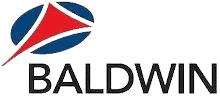An oil skimmer is a mechanical device that removes floating oil, grease and hydrocarbon contaminants from the surface of water. Used across industrial, mining and food processing facilities, skimmers provide continuous, low-maintenance oil separation from wastewater holding tanks, wash bay pits, contaminated ponds and more.
If your site generates oily wastewater from equipment washdowns, fuel storage or industrial operations, a skimmer is typically the first line of treatment before water moves to downstream systems such as coalescing plate separators or oil-water separators. Baldwin Industrial Systems supplies oil-skimming solutions across Australia, helping businesses stay compliant and protect downstream equipment.

Common Types of Industrial Oil Skimmers
Belt Oil Skimmers
Belt skimmers use a continuous loop of oleophilic (oil-attracting) material that passes through the water’s surface. As the belt rotates, oil clings to it and is removed by wiper blades or pinch rollers. They’re durable, easy to maintain and effective for consistent surface oil removal in industrial tanks or pits.
Tube Oil Skimmers
These units work by floating an oil-attracting hose across the water’s surface. The hose is then pulled through the skimmer body, where scrapers remove the oil. Tube skimmers are ideal for recovering thick or layered oil and are often used in workshops, refineries and fuel storage areas.
Floating Weir Skimmers
Floating weir oil skimmers remove surface oil by pulling the uppermost layer of water into a collection chamber. They’re well-suited for open ponds, dams and surface spills where oil builds up in thicker layers. They may be less effective for thin sheen or emulsified oil unless supported by secondary treatment such as a coalescing separator.
Oil skimmers effectively treat wastewater from oil spills, wash bays, food processing equipment, and contaminated ponds or lakes.

Where Are Skimmers Used?
Oil Spill Response
Skimmers are a first-response tool for localised oil spills, preventing hydrocarbons from spreading across water surfaces or entering drainage. They’re fast to deploy and limit environmental impact.
Wash Bay Systems
In mining, civil or transport applications, oil builds up quickly during washdowns. Adding a belt or tube skimmer to your wash bay sump removes free oil early, reducing load on downstream treatment systems such as CPI or coalescing plate separators.
Wastewater Treatment
Industrial wastewater often contains surface oils that can clog filters and reduce treatment performance. Skimmers installed before primary treatment help extend equipment life and maintain compliance with environmental licensing requirements.
Food & Beverage Processing
Skimmers are used in food plants to remove fats, oils and greases (FOG) from process water. This protects trade waste systems, improves hygiene and reduces the risk of blockages and odour.
Contaminated Ponds or Tanks
Stormwater pits, evaporation ponds and holding tanks can accumulate oily runoff. A floating oil skimmer can remove visible surface hydrocarbons and reduce environmental risk, particularly where water is discharged or transported off-site.
Need Advice on the Right Skimmer?
Whether your site handles oily water, washdown runoff or general process wastewater, Baldwin provides engineered oil-skimming systems designed for reliable and compliant performance. Contact us for expert advice and tailored system design support.
Want to speak directly with our engineering team? Call us on (02) 4954 0440.
Skimmer vs Scraper – What’s the Difference?
A skimmer removes floating oil and light contaminants from the water’s surface. It operates continuously and automatically.
A scraper removes heavier sludge or settled hydrocarbons from the base of tanks or pits.
Together, they support complete oil removal from water.
Skimmer vs Absorbent – When to Use Which
Oil skimmers are permanent installations that provide continuous surface oil removal from liquids.
Absorbents (pads, mats, booms) are consumable materials for soaking up spills on land-based surfaces such as workshop floors.
Use a skimmer for ongoing oil contamination in water.
Use an absorbent for spill control on land.

